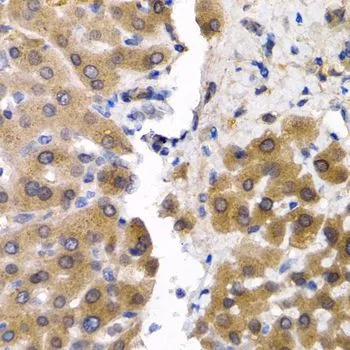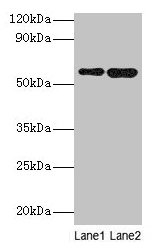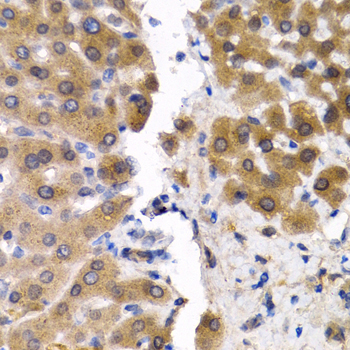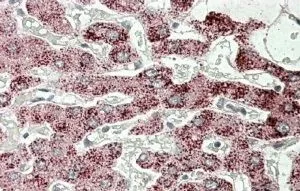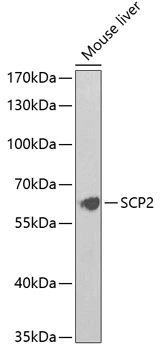
WB analysis of mouse liver tissue lysate using GTX33487 SCP2 antibody. Dilution : 1:1000 Loading : 25μg per lane
SCP2 antibody
GTX33487
ApplicationsWestern Blot, ImmunoHistoChemistry, ImmunoHistoChemistry Paraffin
Product group Antibodies
ReactivityHuman, Mouse
TargetSCP2
Overview
- SupplierGeneTex
- Product NameSCP2 antibody
- Delivery Days Customer9
- Application Supplier NoteWB: 1:500 - 1:2000. IHC-P: 1:50 - 1:200. *Optimal dilutions/concentrations should be determined by the researcher.Not tested in other applications.
- ApplicationsWestern Blot, ImmunoHistoChemistry, ImmunoHistoChemistry Paraffin
- CertificationResearch Use Only
- ClonalityPolyclonal
- ConjugateUnconjugated
- Gene ID6342
- Target nameSCP2
- Target descriptionsterol carrier protein 2
- Target synonymsNLTP, NSL-TP, SCOX, SCP-2, SCP-CHI, SCP-X, SCPX, sterol carrier protein 2, SCP-2/3-oxoacyl-CoA thiolase, SCP-2/thiolase, acetyl-CoA C-myristoyltransferase, epididymis secretory sperm binding protein, non-specific lipid-transfer protein, propanoyl-CoA C-acyltransferase, sterol carrier protein X, straight-chain acyl-CoA oxidase
- HostRabbit
- IsotypeIgG
- Protein IDP22307
- Protein NameSterol carrier protein 2
- Scientific DescriptionThis gene encodes two proteins: sterol carrier protein X (SCPx) and sterol carrier protein 2 (SCP2), as a result of transcription initiation from 2 independently regulated promoters. The transcript initiated from the proximal promoter encodes the longer SCPx protein, and the transcript initiated from the distal promoter encodes the shorter SCP2 protein, with the 2 proteins sharing a common C-terminus. Evidence suggests that the SCPx protein is a peroxisome-associated thiolase that is involved in the oxidation of branched chain fatty acids, while the SCP2 protein is thought to be an intracellular lipid transfer protein. This gene is highly expressed in organs involved in lipid metabolism, and may play a role in Zellweger syndrome, in which cells are deficient in peroxisomes and have impaired bile acid synthesis. Alternative splicing of this gene produces multiple transcript variants, some encoding different isoforms.[provided by RefSeq, Aug 2010]
- ReactivityHuman, Mouse
- Storage Instruction-20°C or -80°C,2°C to 8°C
- UNSPSC41116161

